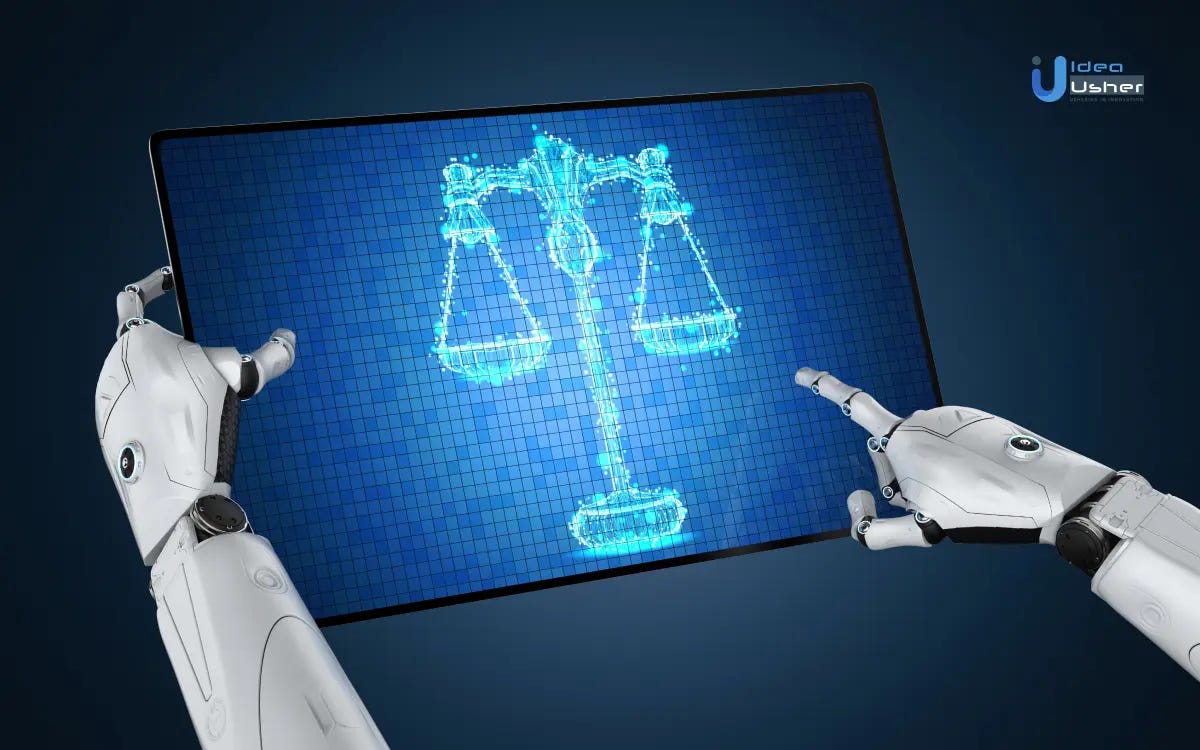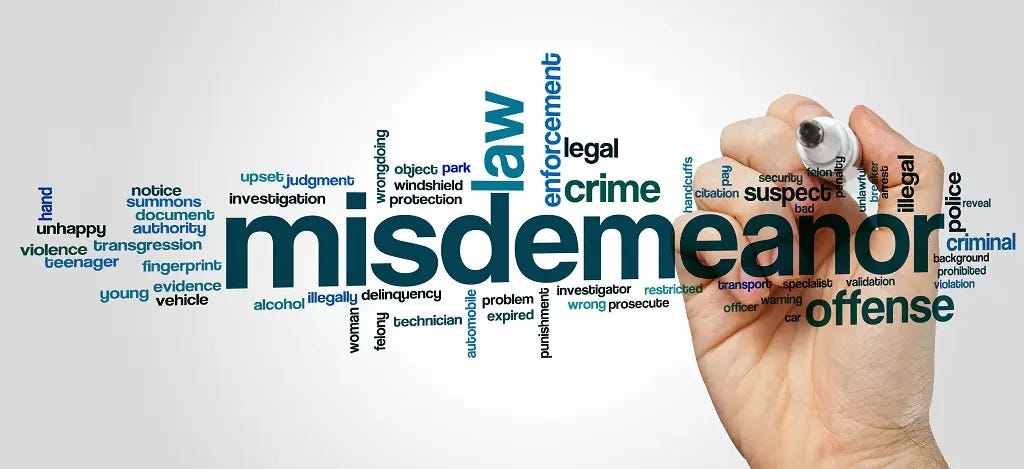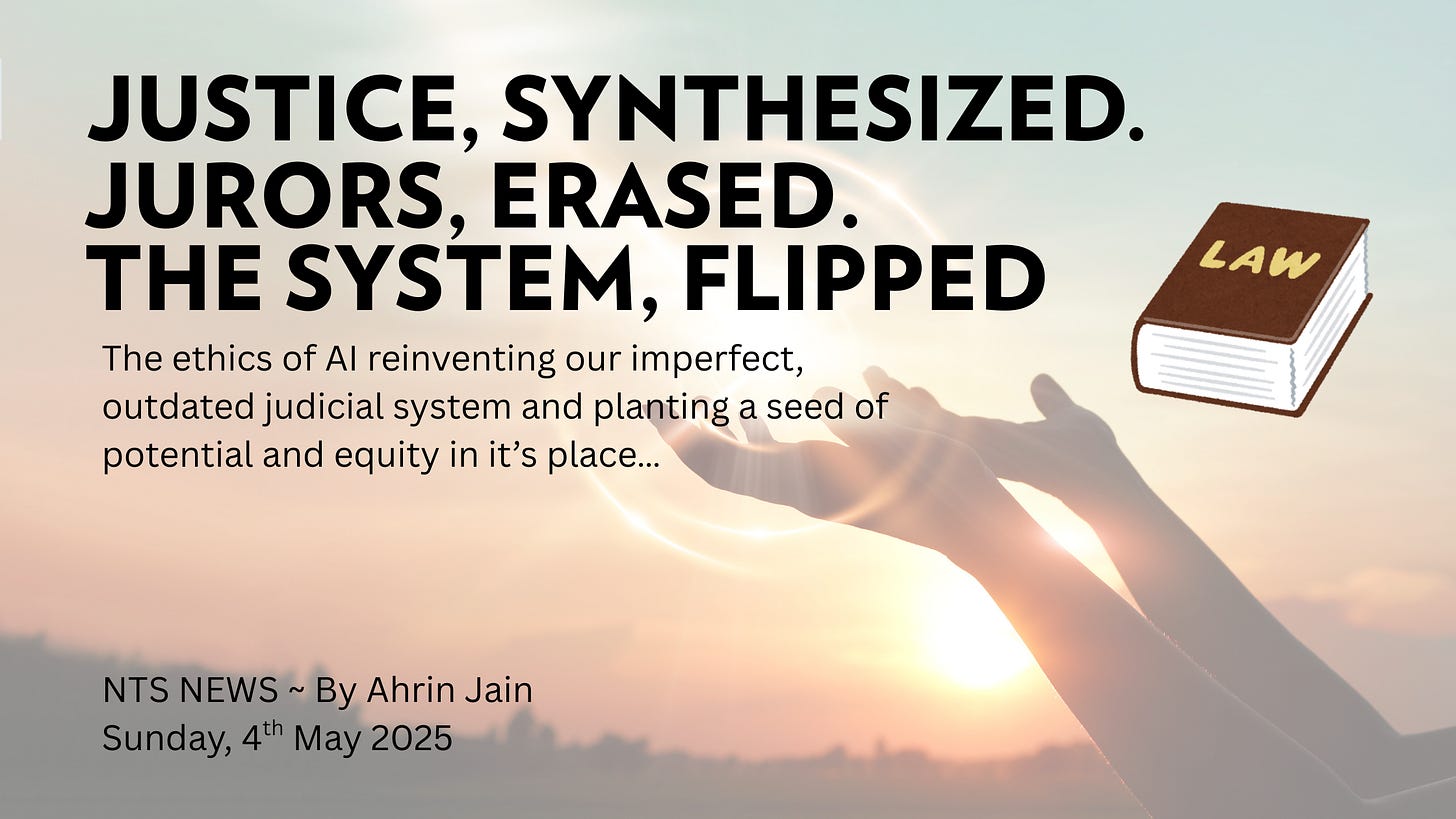Justice, Synthesized. Jurors, Erased. The System, Flipped.
Artificial Intelligence once again seeps into another sector of our world, this time looking to reinvent our world’s flawed and outdated judicial system. Welcome to “Justice, Synthesized.”
Artificial Intelligence (AI), particularly in the last decade, has become arguably the most prominent, valuable, versatile and influential tool ever created. It’s been plugged into everything - life advice, recipes, corporate research, copywriting; even taking over jobs to handle tasks with more efficiency and speed. The potential is almost too large to comprehend - whilst there are seemingly infinite prospects to plug AI into, I pondered:
Surely, if AI could do so much already, couldn’t it remake the justice sector of the world for the better?

Around the world, different governments have devised a various selection of methods and approaches to tackle crime and injustice in their respective countries. For instance, in the USA, the defendant has a constitutional right to a trial by jury - meanwhile, across the world in Japan, they do things very differently. There, juries are reserved for only the most high-profile cases, contrasting greatly to America’s methods.
In other countries, specifically those with totalitarian-style governments (e.g., China and Russia), the government will often host a special trial designed to be rigged in favor of the prosecution, meaning the defendant will almost always be forced to submit to jail time or, often to fuel the country’s economy, a large monetary fine.
What one can learn from the above three examples is that justice isn’t perfect. Every government has varying degrees of punishment, court systems and uncountable complexities forming the basis on how the country eliminates crime.
Nowhere on this planet will you find a country with a perfect justice system.
Nowhere.
With humans in charge, a perfectly impartial and just legal system is unfeasible and unrealistic. Judges and jurors will always have biases, whether unconscious or not, and a handful of innocent defendants will unfortunately be subject to punishment due to wrong convictions. The seemingly small imperfections in the global judicial system have the potential to ruin people’s lives, rift families apart and steal innocent people from society.
To eliminate these imperfections entirely is impossible if the system is human-run. But what if, instead, we delegated this task to the only non-biased judge; AI.
Artificial Intelligence has developed rapidly in the last decade, its capabilities exponentially expanding to enhance a wide selection of human-run activities. Securely storing every sliver of knowledge and wisdom that mankind has ever known, produced or discovered, AI has the capability to judge criminal cases with a vast arsenal of data and information. Therefore, one could argue that since regular judges, jurors and lawyers do not have access to what AI does, their decision(s) will always have some bias as the limitation of information can severely impact final judgments.
Inserting AI into the legal world could streamline everything. The prosecution could feed the system its evidence and sources connected to the crime or felony, whilst the defense will input points as to how the prosecution’s argument is self-incriminating, insufficient, false or misdirected. The computer, applying both the information given by the two parties and utilizing judgements reached in similar cases, could provide the government with a non-partisan, equitable and unprejudiced verdict. With this simple, elegant approach to justice, not only would the global justice system become more fair, but an unprecedented amount of resources and money would also be saved.
Instead of overstressed judges too exhausted to reach a fair and balanced verdict, cases could be closed in mere minutes rather than endless days and weeks, if not months.
Instead of allowing our global judicial system to gradually crumble as it is today, we could apply the versatile and limitless potential of AI.

Instead of dictators - that throw hundreds of innocent defendants into jail per annum - international law could instead enforce the new technology as a mandatory addition.
Whilst many would proclaim that, whilst AI advancements have skyrocketed, our technology just isn’t strong enough to assert the power of imprisonment and, in some regions, even death over the human race. “Mistakes” would be intolerable - they could forever ruin the lives of a family, destroy bright ideas and leave innocents defenseless against a sentence they never deserved.
For these reasons, this is why I would like to ask the legal executives of our world to impose an Artificial Legal Judge (ALJ) for civil offenses (Level 1) and misdemeanors (Level 2), excluding violent crimes.
According to the Crown Prosecution Service (UK), crimes are primarily divided into three levels of severity. A civil offense is a Level 1 crime and is the most minor charge one can face - this can include speeding or wrongly passing a red light. A misdemeanor is a Level 2 crime and can involve more serious crimes, including vandalism and shoplifting, but no violence (this is reserved for felonies, Level 3, for serious offenses including assault, homicide and murder).

Considering felonies (Level 3) are extremely sensitive and serious cases, I personally believe that these should be reserved for human judges and jurors, with the cases being run in a regular fashion. However, instead of civil offenses (Level 1) and misdemeanors (Level 2) requiring around 12 people to put in anywhere from 8-48 hours of work, why not simplify the process and allow AI to smoothly run the cases?
For the bulk of civil offenses and misdemeanors, it’s highly unlikely the defendant will face imprisonment as their sentence; on the whole, convicted offenders will likely face a small fine, community service or potentially a warning for more minor infractions. Rather than waste the lives and resources of so many humans, if we were to let AI handle the process, everything would run smoother and the system would graduate to become more speedy and efficient.
The newfound excess of lawyers, judges, jurors and other legal workers could be used for the more serious and complex cases, like the Level 3 felonies. According to studies published by Clio and Legal Cheek, over 92% of the UK’s lawyers put in more than 12-hour working days, rendering them exhausted and overtired.
Major law firms across the UK are scrambling to attract the best legal minds and failing miserably, with many describing this as a ‘lawyer shortage epidemic.’
Hiring AI to complete the minor cases, however, opens up plenty of opportunities for legal employees to step in for cases that require more attention and scrutiny. Instead of a drowsy judge reaching a decision just to close a case, felonies would have a much more thoughtful and thorough approach in reaching verdicts.
IN CONCLUSION, considering the information available and the fact that nowhere on Earth has a perfect legal system, AI is the judge and jury of the future, the perfect solution that society desperately needs. Immaculately fixing our crumbling judicial systems, Artificial Intelligence could be the next giant step in slowly eliminating global crime.
THANK YOU FOR READING! We’re extremely grateful to have you part of our NTS NEWS community. Our entire journalism team would like to formally apologize for the lack of article flow; we would like to reiterate we have a steady stream of content prepared for you. For all paid subscribers and founding members, please email us upon your subscription expiry as, to compensate for lack of writing, we will offer one year complementary of premium NTS NEWS.
RESEARCH SOURCES: For this article, no research sources were used! Because the idea of the article was founded on the basis of pure opinion, every ounce of this writing has come from the heart.






Great article Ahrin :-)
💬 COMMENT your thoughts and opinions - we’d love to hear them! Do you agree? Is this taking AI too far?